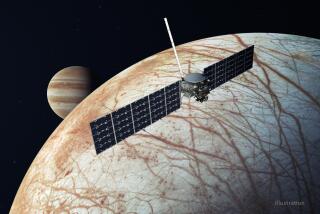Space Enthusiasts Campaign to Restore Mission to Pluto
- Share via
Advocates of the tiny planet Pluto now have a new mission: getting NASA to restore a suspended trip to the smallest and most distant member of the solar system--the only one that remains unexplored.
Citing ballooning costs for space missions, NASA officials ordered an immediate work stoppage late last month on the Pluto-Kuiper Express mission being planned at the Jet Propulsion Lab in Pasadena. Originally scheduled to be launched in 2004 and to reach the icy planet by 2012, a spacecraft is now not expected to reach Pluto until 2020--a date some scientists say will be too late to probe the planet’s vanishing atmosphere.
But that decision is stirring up something of a public revolt. In just two weeks, the Planetary Society, a Pasadena-based group of space exploration enthusiasts, has received 10,000 letters protesting the suspension of the mission. And a Web petition created by a Pennsylvania teenager has received hundreds of signatures in just days.
“Pluto is the only planet in our solar system that has not been explored,” said Louis Friedman, executive director of the Planetary Society. “We ought to finish the job we started in 1960.”
Though studied extensively from Earth, Pluto remains mysterious. It hasn’t even been photographed clearly. An image by the world’s best space telescope, the Hubble, reveals only faint blurs of dark and light on the surface of the planet, which is usually the farthest from the sun.
“A lot of Americans have a lot of faith in the space program. It really lets people down when they cancel a mission,” said Ted Nichols II, a 17-year-old high school senior and amateur astronomer from near Harrisburg, Pa., who created the https://www.plutomission.com Web site.
Those signing on to the petition site come from all over this planet. “Vamos a Pluton!!!” reads a note from Argentina. “I want to be alive when the information comes back,” pleads a woman from Albuquerque.
Both Nichols and Friedman are surprised at the potent public response to Pluto. It may be because the distant planet has “the mystery of the edge,” surmises Friedman. Doug Stetson, who manages solar system exploration for JPL thinks it may be because most people dislike unfinished business. “There’s a real desire to complete the first wave of exploration,” he said.
But Alan Stern, an expert on Pluto at the Southwest Research Institute, is not surprised at all. “I think it’s because it’s diminutive,” he said of the planet, which is two-thirds the size of Earth’s moon. “Pluto’s the little planet that could. It’s every schoolkid’s favorite.”
Stern is among scientists concerned that a delayed mission will arrive too late to study the planet’s tenuous atmosphere. As Pluto moves away from the sun in its elliptical orbit, the atmosphere will freeze and collapse to the planet’s surface as snow. Though it is not known when this will occur, some models show it happening before 2020, Stern said. Postponing launch also means losing the ability to use the gravity of Jupiter to help speed the craft as it hurtles outward.
“It would be a travesty if we showed up after the atmosphere collapsed onto the surface. It would be embarrassing to show up with a suite of atmospheric instruments,” said Stern, who is seeing, for the second time in a decade, a mission to Pluto postponed after lost missions to Mars.
“It’s the same story again,” he said. “I feel like I’m in a Fellini film.”
Stetson and some planetary scientists agree that some of the atmosphere may still be in place to study in 2020. He said other aspects of the mission, such as studying the primitive material surrounding Pluto in the so-called Kuiper belt at the far reaches of the solar system could yield clues about the system’s origin and life within it.
Stern is hoping NASA, with a $14-billion annual budget, will find a way to restore the mission, which had been expected to cost $500 million. A 1,200-member coalition of planetary scientists has also asked that the mission be restored to its original schedule, but not at the cost of other scheduled missions.
Since the trip to Pluto is time-sensitive, some space enthusiasts say NASA should have chosen to delay other missions, such as one to Jupiter’s moon Europa, which remains on track. “Europa’s not going anywhere,” said Nichols. “Nature’s not going to wait for us to get to Pluto.”
The Planetary Society plans to send the letters it has gathered to select members of the U.S. House and Senate. Nichols said he may travel to Washington with his petition. Their hope is that Congress will issue a directive to restore the mission or free up more money for NASA to continue it as scheduled. Although some NASA insiders said restoring the original mission remains a long shot, others said some work was quietly under way to return to an earlier launch.
Buoyed by the almost instant success of his petition drive, Friedman was optimistic. “I have high hopes of awakening NASA and the Congress to the priority of Pluto,” he said, as he thumbed through responses from Alaska, Georgia and Indiana. “They’re going to realize they can’t just put it off. There has to be a sense of now about it.”






